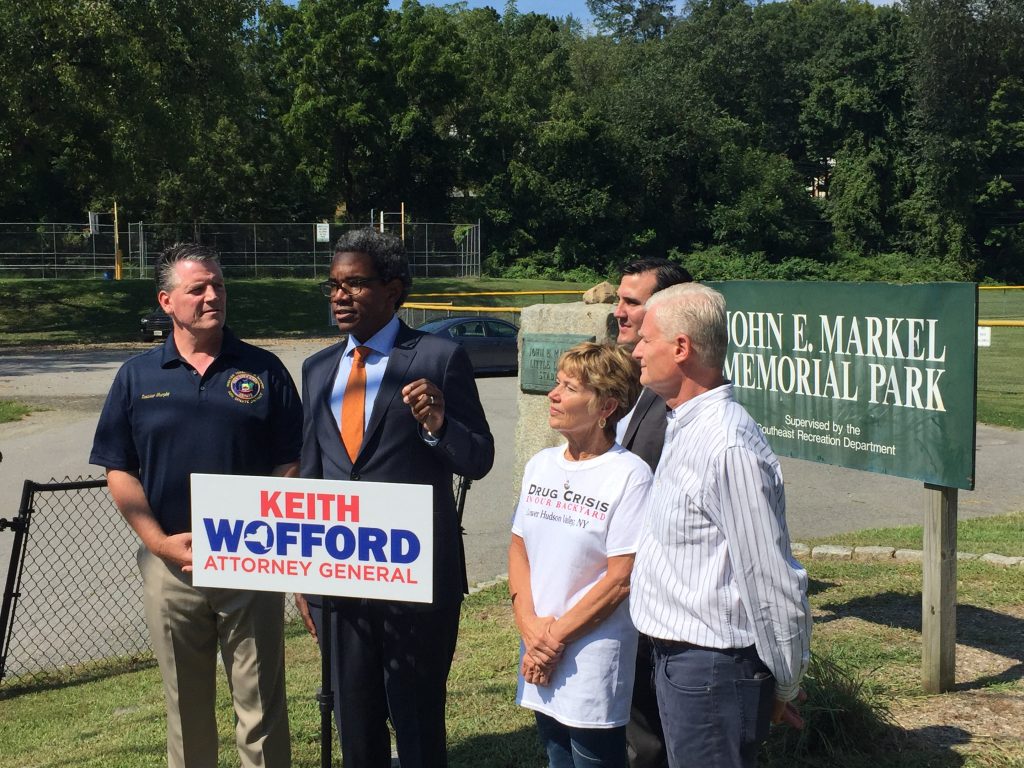GOP Nominee for State AG Stops by Brewster

With a crowded Democratic primary for New York State Attorney General set for this week, the established GOP nominee for the top statewide law enforcement office took a trip to Brewster vowing to keep health insurance companies honest.
Manhattan-based attorney Keith Wofford is running for public office for the first time in his life as he goes up against a hostile environment for Republicans, especially in a blue state like New York. But Wofford said the state needs a person who’s going to work for the taxpayers and not for other politicians. Vowing to brush aside “insider politics,” Wofford has been crisscrossing the state, which included a stop in Brewster last week.
Joined by NYS Sen. Terrence Murphy, Assemblyman Kevin Byrne, and Drug Crisis in Our Backyard co-founders Susan and Steve Salomone, Wofford spoke about ensuring health insurance companies allow residents suffering from drug addiction to stay in rehab programs for the required amount of time. Murphy helped pass legislation in 2016 that cut some of the red tape for addicts seeking treatment because of health insurance constraints, but some of those insurance companies are still making it difficult.
During the press conference, Wofford said the law makes clear that insurance companies need to provide the pre- requisite amount of time for those suffering from an addiction and seeking professional help. As attorney general, Wofford said he would make sure insurance companies follow the law.
Murphy said he wants an attorney general who will stick up to insurance companies and allow people that need help fighting an addiction to remain in treatment centers longer than insurance companies would like. The legislation that was passed to help addicts isn’t working because insurance companies aren’t “living up to their end of the bargain,” Murphy said.
“It’s life or death,” Murphy said. “This has nothing to do with politics. It has everything to do with saving lives.”
In an interview following the press briefing, Wofford explained his vision for the AG’s office if he’s elected.
Wofford said the last three attorney generals — Democrats Andrew Cuomo, Elliot Spitzer, and Eric Schneiderman — were not concerned with “the people’s business.”
“There’s an opportunity now to make a change,” he said. “It’s so clear we have a problem with corruption, we have a huge problem with chasing business out of the state, we have a huge problem with attorney generals twisting the law and using the law for political purposes and because that crisis is so clear to voters, (political) party is not going to matter.”
Wofford will find out who his Democratic opponent for the general election is Thursday night, when primary voters go to the polls to select the Democratic nominee. The four-way race is between Congressman Sean Patrick Maloney, New York City advocate Letitia James, law professor Zephyr Teachout, and former Hillary Clinton senior policy advisor Leecia Eve.
All four of the candidates have focused heavily on Republican President Donald Trump during their campaigns. Wofford hopes to exchange ideas about the problems this state is facing, rather than concentrate on a national figure.
Voters that Wofford have spoken to say they continue to see “headline after headline” how New York is handling business the wrong way. When Schneiderman resigned after he was credibly accused of abusing women he formerly dated, Wofford said it was just another example of the poor conduct New Yorkers don’t want.
“People are just tired of it,” Wofford said. “They want someone working for them and not for themselves and not for the other politicians.”
When discussing the current state of the AG’s office, Wofford said he questioned the countless lawsuits being doled out by interim Attorney General Barbara Underwood, stating there is no clarity how these legal actions will help taxpayers.
Underwood, like her predecessor Schneiderman, has filed multiple lawsuits against the Trump administration. The notion that a dozen lawsuits are filed in a political year reeks of political motivation, Wofford said.
“You’ve got to focus on and prioritize on what’s most meaningful to working class people, small businesses, middle class people and people who create jobs in this state,” Wofford said.
